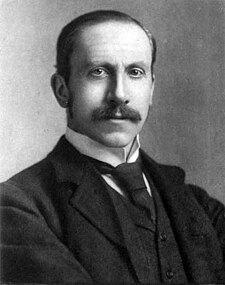Alfred Milner, 1st Viscount Milner
|
The Right Honourable The Viscount Milner KG GCB GCMG PC |
|
|---|---|
 |
|
|
Governor of the Cape Colony and High Commissioner for Southern Africa |
|
|
In office 5 May 1897 – 6 March 1901 |
|
| Monarch |
Queen Victoria Edward VII |
| Prime Minister |
John Gordon Sprigg William Philip Schreiner John Gordon Sprigg |
| Preceded by | Sir William Howley Goodenough |
| Succeeded by | Sir Walter Francis Hely-Hutchinson |
| Administrator of the Transvaal and the Orange River Colony | |
|
In office 4 January 1901 – 23 June 1902 |
|
| Monarch |
Queen Victoria Edward VII |
| Lieutenant | Hamilton John Goold-Adams |
| Preceded by |
Office Established Christiaan de Wet As State President of the Orange Free State (31 May 1902) Schalk Willem Burger As President of the South African Republic (31 May 1902) |
| Succeeded by | Himself As Governor of the Transvaal and Orange River Colony |
| 1st Governor of the Transvaal and Orange River Colony | |
|
In office 23 June 1902 – 1 April 1905 |
|
| Monarch | Edward VII |
| Preceded by | Himself as Administrator the Transvaal and Orange River Colony |
| Succeeded by | The Earl of Selborne |
| Secretary of State for War | |
|
In office 18 April 1918 – 10 January 1919 |
|
| Monarch | George V |
| Prime Minister | David Lloyd George |
| Preceded by | The Earl of Derby |
| Succeeded by | Winston Churchill |
| Secretary of State for the Colonies | |
|
In office 10 January 1919 – 13 February 1921 |
|
| Monarch | George V |
| Prime Minister | David Lloyd George |
| Preceded by | Walter Long |
| Succeeded by | Winston Churchill |
| Personal details | |
| Born |
Alfred Milner 23 March 1854 Gießen |
| Died | 13 May 1925 (aged 71) Great Wigsell, East Sussex |
| Resting place | Saint Marys the Virgin Church, Salehurst, East Sussex, UK |
| Nationality |
|
| Political party | Conservative |
| Spouse(s) | Violet Milner |
| Alma mater |
University of Tübingen King's College London Balliol College, Oxford |
| Occupation | Colonial administrator, politician |
| Religion | Christian |
Alfred Milner, 1st Viscount Milner, KG, GCB, GCMG, PC (23 March 1854 – 13 May 1925) was a British statesman and colonial administrator who played an influential leadership role in the formulation of foreign and domestic policy between the mid-1890s and early 1920s. He was the key imperial official in using poor diplomacy that helped cause the Second Boer War of 1899–1902. Historian Bill Nasson says:
While serving as High Commissioner, he mentored a gathering of young members of the South African Civil Service, informally known as Milner's Kindergarten several of whom became important figures in administering the British Empire. From December 1916 to November 1918, he was one of the most important members of David Lloyd George's War Cabinet.
An influential public servant for three decades, Milner was a visionary exponent of imperial unity at a time when imperialism was beginning to be called into question. His reputation exceeded his achievements: Office and honours were heaped upon him despite his lack of identification with either major political party.
Milner's partial German ancestry dates to his paternal grandmother, married to an Englishman who settled in the Grand Duchy of Hesse (modern state of Hesse in west-central Germany). Their son, Charles Milner, who was educated in Hesse and England, established himself as a physician with a practice in London and later became Reader in English at Eberhard Karls University of Tübingen in the Kingdom of Württemberg (modern state of Baden-Württemberg). His wife was a daughter of Major General John Ready, former Lieutenant Governor of Prince Edward Island and later the Isle of Man. Their only son, Alfred Milner, was born in the Hessian town of Giessen and educated first at Tübingen, then at King's College School and, from 1872 to 1876, as a scholar of Balliol College, Oxford, studying under the classicist theologian Benjamin Jowett. Having won the Hertford, Craven, Eldon and Derby scholarships, he graduated in 1877 with a first class in classics and was elected to a fellowship at New College, leaving, however, for London in 1879. At Oxford he formed a close friendship with young economic historian Arnold Toynbee, writing a paper in support of his theories of social work and, in 1895, twelve years after his death at the age of 30, penning a tribute, Arnold Toynbee: a Reminiscence.
...
Wikipedia
